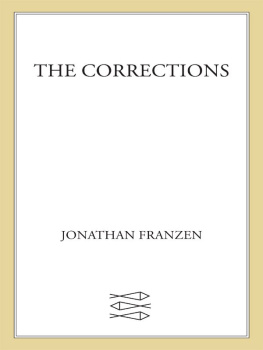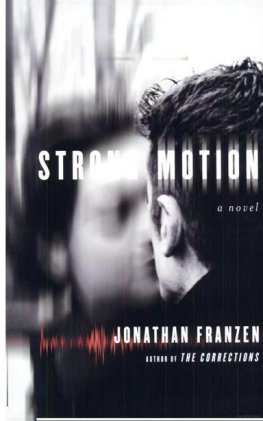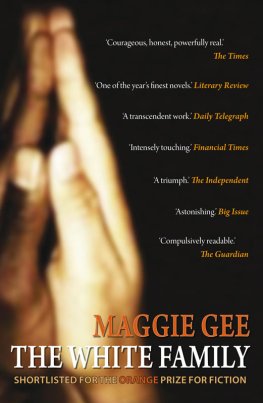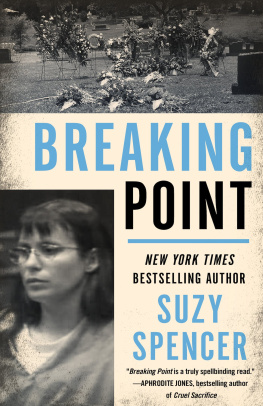Jonathan Franzen THE CORRECTIONS
ST. JUDE
THE MADNESS of an autumn prairie cold front coming through. You could feel it: something terrible was going to happen. The sun low in the sky, a minor light, a cooling star. Gust after gust of disorder. Trees restless, temperatures falling, the whole northern religion of things coming to an end. No children in the yards here. Shadows lengthened on yellowing zoysia. Red oaks and pin oaks and swamp white oaks rained acorns on houses with no mortgage. Storm windows shuddered in the empty bedrooms. And the drone and hiccup of a clothes dryer, the nasal contention of a leaf blower, the ripening of local apples in a paper bag, the smell of the gasoline with which Alfred Lambert had cleaned the paintbrush from his morning painting of the wicker love seat.
Three in the afternoon was a time of danger in these gerontocratic suburbs of St. Jude. Alfred had awakened in the great blue chair in which hed been sleeping since lunch. Hed had his nap and there would be no local news until five oclock. Two empty hours were a sinus in which infections bred. He struggled to his feet and stood by the Ping-Pong table, listening in vain for Enid.
Ringing throughout the house was an alarm bell that no one but Alfred and Enid could hear directly. It was the alarm bell of anxiety. It was like one of those big cast-iron dishes with an electric clapper that send schoolchildren into the street in fire drills. By now it had been ringing for so many hours that the Lamberts no longer heard the message of bell ringing but, as with any sound that continues for so long that you have the leisure to learn its component sounds (as with any word you stare at until it resolves itself into a string of dead letters), instead heard a clapper rapidly striking a metallic resonator, not a pure tone but a granular sequence of percussions with a keening overlay of overtones; ringing for so many days that it simply blended into the background except at certain early-morning hours when one or the other of them awoke in a sweat and realized that a bell had been ringing in their heads for as long as they could remember; ringing for so many months that the sound had given way to a kind of metasound whose rise and fall was not the beating of compression waves but the much, much slower waxing and waning of their consciousness of the sound. Which consciousness was particularly acute when the weather itself was in an anxious mood. Then Enid and Alfredshe on her knees in the dining room opening drawers, he in the basement surveying the disastrous Ping-Pong tableeach felt near to exploding with anxiety.
The anxiety of coupons, in a drawer containing candles in designer autumn colors. The coupons were bundled in a rubber band, and Enid was realizing that their expiration dates (often jauntily circled in red by the manufacturer) lay months and even years in the past: that these hundred-odd coupons, whose total face value exceeded sixty dollars (potentially one hundred twenty dollars at the Chiltsville supermarket that doubled coupons), had all gone bad. Tilex, sixty cents off. Excedrin PM, a dollar off. The dates were not even close. The dates were historical. The alarm bell had been ringing for years.
She pushed the coupons back in among the candles and shut the drawer. She was looking for a letter that had come by Registered mail some days ago. Alfred had heard the mailman knock on the door and had shouted, Enid! Enid! so loudly that he couldnt hear her shouting back, Al, Im getting it! Hed continued to shout her name, coming closer and closer, and because the sender of the letter was the Axon Corporation, 24 East Industrial Serpentine, Schwenksville, PA, and because there were aspects of the Axon situation that Enid knew about and hoped that Alfred didnt, shed quickly stashed the letter somewhere within fifteen feet of the front door. Alfred had emerged from the basement bellowing like a piece of earth-moving equipment, Theres somebody at the door! and shed fairly screamed, The mailman! The mailman! and hed shaken his head at the complexity of it all.
Enid felt sure that her own head would clear if only she didnt have to wonder, every five minutes, what Alfred was up to. But, try as she might, she couldnt get him interested in life. When she encouraged him to take up his metallurgy again, he looked at her as if shed lost her mind. When she asked whether there wasnt some yard work he could do, he said his legs hurt. When she reminded him that the husbands of her friends all had hobbies (Dave Schumpert his stained glass, Kirby Root his intricate chalets for nesting purple finches, Chuck Meisner his hourly monitoring of his investment portfolio), Alfred acted as if she were trying to distract him from some great labor of his. And what was that labor? Repainting the porch furniture? Hed been repainting the love seat since Labor Day. She seemed to recall that the last time hed painted the furniture hed done the love seat in two hours. Now he went to his workshop morning after morning, and after a month she ventured in to see how he was doing and found that all hed painted of the love seat was the legs.
He seemed to wish that she would go away. He said that the brush had got dried out, that that was what was taking so long. He said that scraping wicker was like trying to peel a blueberry. He said that there were crickets. She felt a shortness of breath then, but perhaps it was only the smell of gasoline and of the dampness of the workshop that smelled like urine (but could not possibly be urine). She fled upstairs to look for the letter from Axon.
Six days a week several pounds of mail came through the slot in the front door, and since nothing incidental was allowed to pile up downstairssince the fiction of living in this house was that no one lived hereEnid faced a substantial tactical challenge. She didnt think of herself as a guerrilla, but a guerrilla was what she was. By day she ferried matriel from depot to depot, often just a step ahead of the governing force. By night, beneath a charming but too-dim sconce at a too-small table in the breakfast nook, she staged various actions: paid bills, balanced checkbooks, attempted to decipher Medicare co-payment records and make sense of a threatening Third Notice from a medical lab that demanded immediate payment of $0.22 while simultaneously showing an account balance of $0.00 carried forward and thus indicating that she owed nothing and in any case offering no address to which remittance might be made. It would happen that the First and Second Notices were underground somewhere, and because of the constraints under which Enid waged her campaign she had only the dimmest sense of where those other Notices might be on any given evening. She might suspect, perhaps, the family-room closet, but the governing force, in the person of Alfred, would be watching a network newsmagazine at a volume thunderous enough to keep him awake, and he had every light in the family room burning, and there was a non-negligible possibility that if she opened the closet door a cascade of catalogues and House Beautifuls and miscellaneous Merrill Lynch statements would come toppling and sliding out, incurring Alfreds wrath. There was also the possibility that the Notices would not be there, since the governing force staged random raids on her depots, threatening to pitch the whole lot of it if she didnt take care of it, but she was too busy dodging these raids to ever quite take care of it, and in the succession of forced migrations and deportations any lingering semblance of order was lost, and so the random Nordstrom shopping bag that was camped behind a dust ruffle with one of its plastic handles semidetached would contain the whole shuffled pathos of a refugee existencenon-consecutive issues of Good Housekeeping, black-and-white snapshots of Enid in the 1940s, brown recipes on high-acid paper that called for wilted lettuce, the current months telephone and gas bills, the detailed First Notice from the medical lab instructing co-payers to ignore subsequent billings for less than fifty cents, a complimentary cruise ship photo of Enid and Alfred wearing leis and sipping beverages from hollow coconuts, and the only extant copies of two of their childrens birth certificates, for example.














